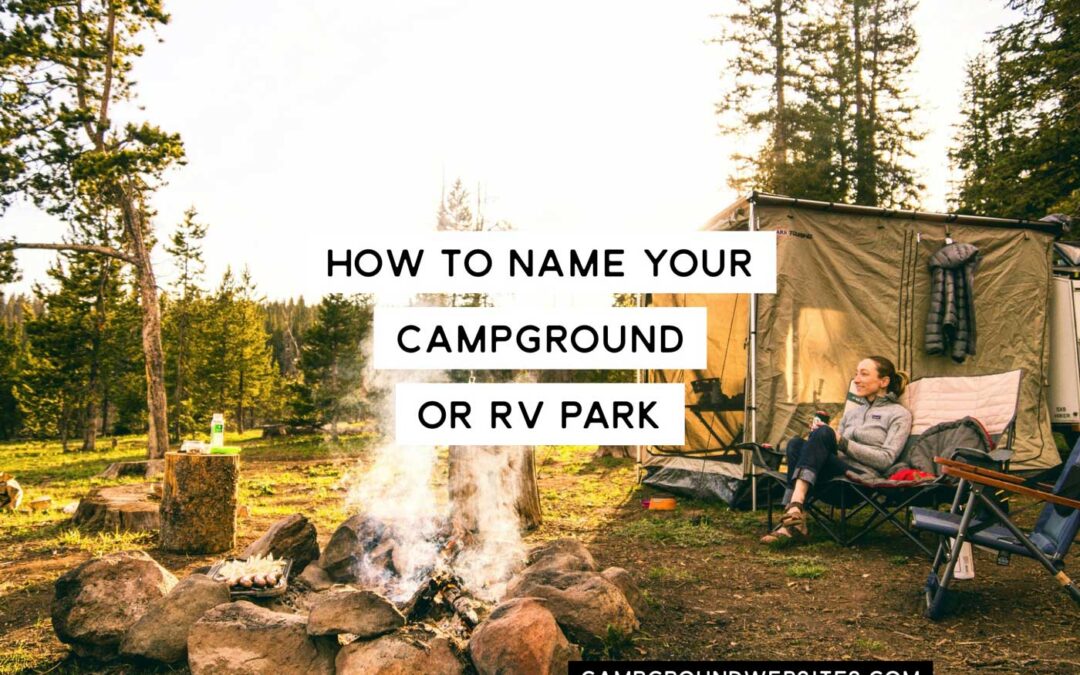Before diving into the intricacies of naming and branding, it’s essential to recognize that a campground’s identity is the cornerstone of its market presence. A well-crafted name and cohesive branding strategy not only attract visitors but also foster loyalty, differentiate the business from competitors, and encapsulate the unique experience offered.
Automated Campground Name Generator Downfall:
A campground name generator is just a tool that combines a few words to create suggestions. An automated name generator may mashup “Desert” or “Mountain” or “Lake” and “View” which is a terrible name if you’re not in the desert or you don’t have a view of the mountains or lakes.
Ultimately, considering your community, your customers and guests, and who you want to serve at your campground or RV park is the best way to choose a name for your new campground or RV park. We’ve put together a few things to consider when choosing the perfect name.
What to avoid when naming your campground:
We’ve talked with a lot of campground and RV park owners – some with great names and some with recommendations to reconsider. While there are no hard and fast rules for what to avoid, we thought we’d start out with what to avoid so you have a foundation when considering your RV park name.
As a general rule, choose something clear over something ‘clever.’
Campground name ideas to avoid:
- Lengthy names (should be 3-4 short words tops, but shorter is better). Would you be more likely to remember “Between the majestic pines campground” or “Springfield Pines Campground”?
- Culturally inappropriate names or terms
- Anything that might be trademarked by someone else (like a sports team name, a restaurant, or an existing brand name that’s commonly recognizable)
- Intentional misspellings (like GottaGetRVin or Slickz Kampground) – maybe memorable, but difficult for people to remember how to spell your name to find your website
- Inaccuracy that could lead to disappointment if someone visits – like “Lake Example Shores” when you’re actually 26 miles from Lake Example
- Abstract names like “Plentiful RV Park” or “Subtle Horizons Campground”
Some examples of GREAT Strategies for naming your Campground or RV Park:
- <City Name> RV Park
- A descriptive name like “Example Lake Campground” or “Peaceful Escape RV Park”
- <Your Family Name> Family RV Park
- <County> RV Park
- A location like “Downtown Springfield RV Park” or “Lake Example Shoreline Campground”
- A name that describes your events or unique features to potential customers like “Bluegrass Paradise” or “Golfers Getaway Campground”
- Something that uses alliteration, like “Peaceful Pines” or “Campbell Campground” can be memorable
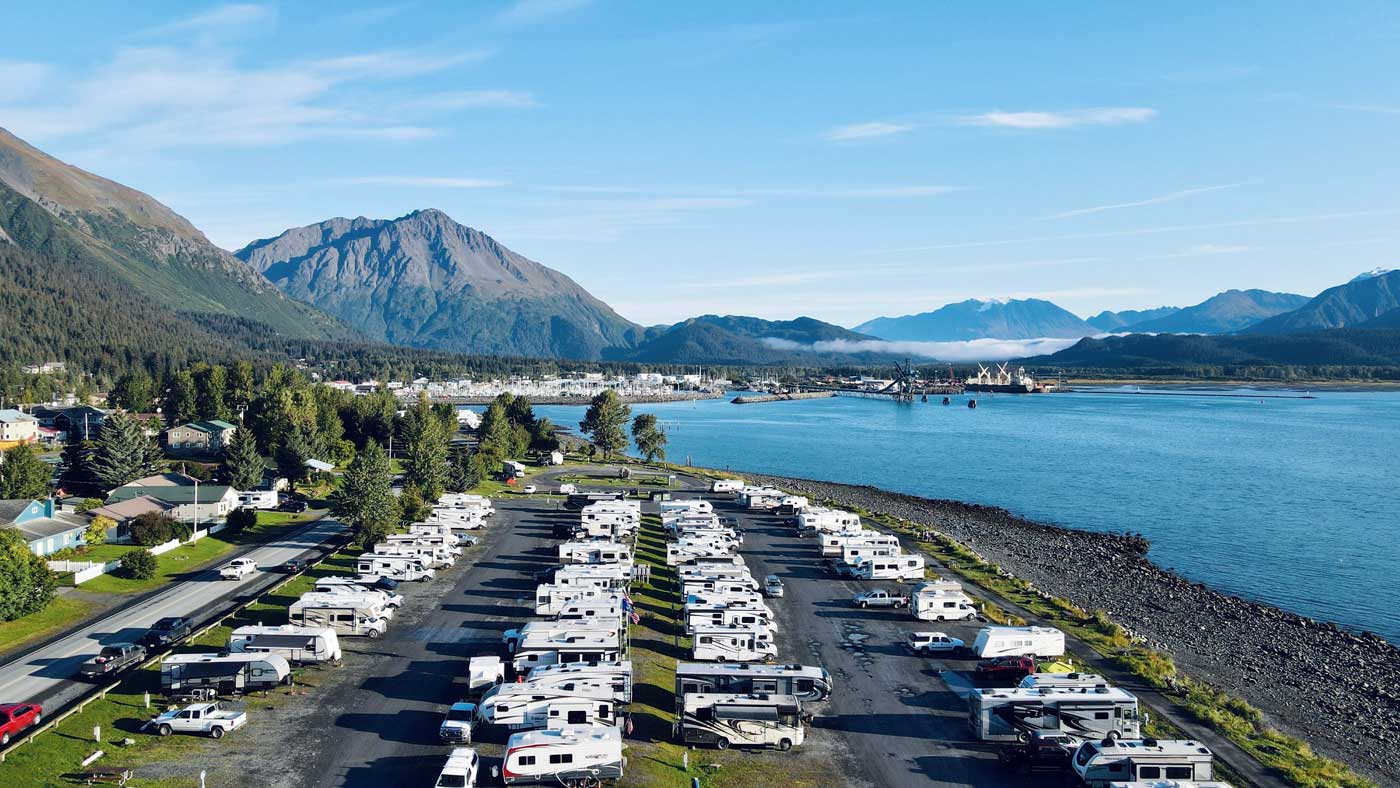
Naming your campground “Lakeshore RV Park” or “Waterfront RVPark” will give RVers an idea of what to expect when visiting your park.
Let’s start with the most common question:
Should I call my park an RV Park, RV Resort, or Campground?
Our team is made up of full-time RVers. Some of us have been on the road since 2018, so we’re not just talking theory here. There are some general ideas that we get when we hear RV park, RV Resort, and Campground, but there are no clearly defined lines.
Here’s our 2 cents. Take it for what it’s worth:
Campground: If you only have tent sites, then you’re a campground, and you can rule out “RV Park.” If you do have RV sites, you’re in nature, and generally people are coming to get away from the busyness of the city and sit around a campfire or have a BBQ, then go with “Campground.”

If your park looks like this, you could name it a campground
RV Park: We would anticipate that an RV park may have some amenities like a pool, tennis courts, or a clubhouse, but may not be surrounded by woods or far from the city. We often expect an RV park to be somewhere to use as a home base for exploring the area. If you’re downtown or right off the highway, then ‘RV park’ is a great name. Often, an RV Park is just a practical spot to spend the night where we unhitch and then go sightseeing.
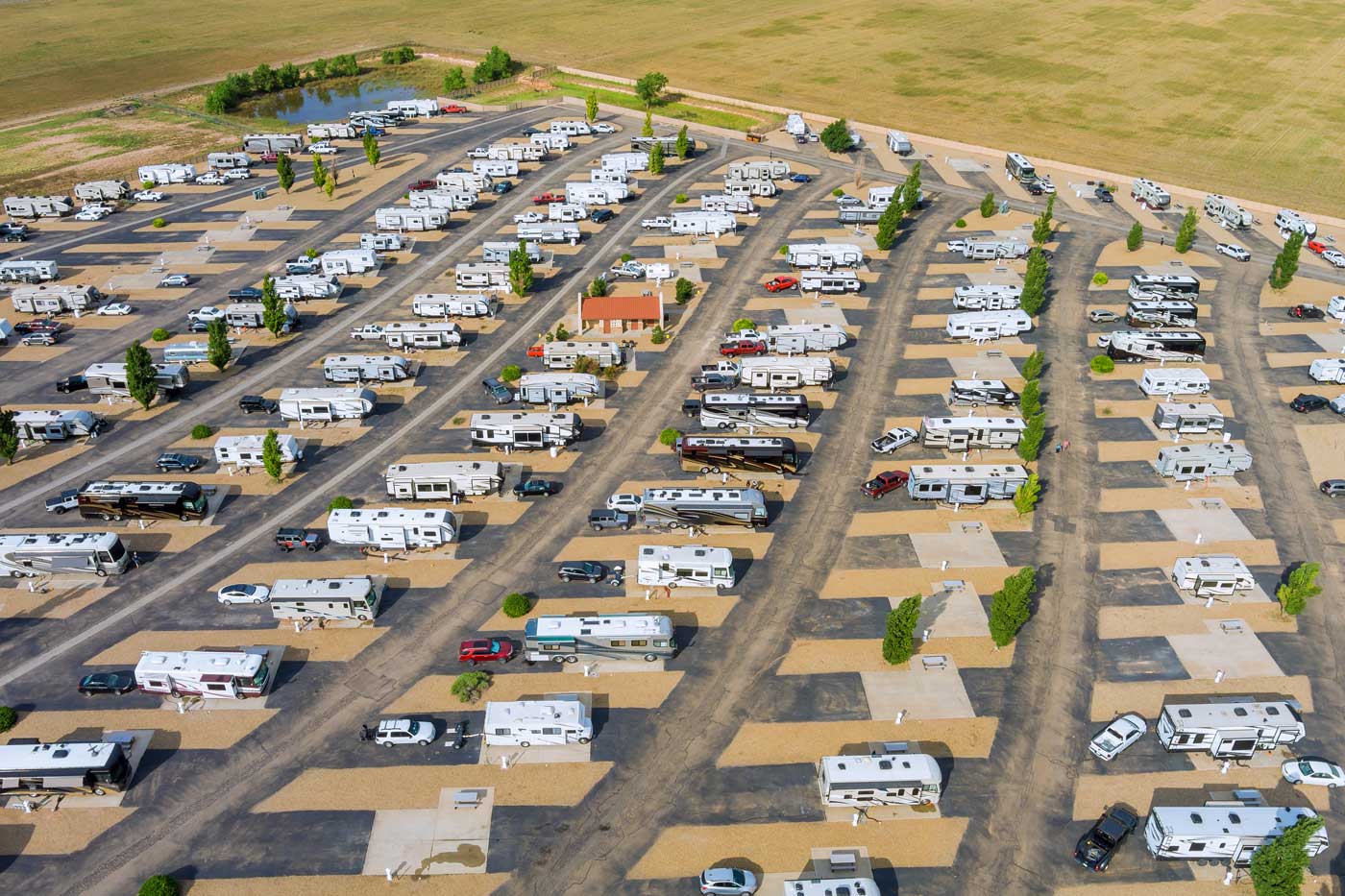
If your park looks like this, name it an RV Park. A practical place to enjoy your RV
RV Resort: An RV Resort often gives the impression of a destination. We’re bringing our RV to use resort amenities like a waterpark, mini-golf, arcade, pickleball courts, or an on-site restaurant. For an RV Resort, we’re expecting manicured landscaping and paved roads, not rustic hiking trails.

Landscaped sites with plenty of amenities means you could call your park an RV Resort
If your park is in a grey area, then just pick the category that you think best represents you. There are no hard and fast rules.
Here are some considerations for naming your park. If you already have a name in mind, use these ideas as a litmus test for naming your campground:
Understanding Your Campground’s Target Audience
Demographics and Psychographics
The first step in branding a campground involves a deep understanding of the target audience. Are the primary visitors families seeking kid-friendly activities, retirees looking for tranquility, or adventure-driven millennials? For example, a name like “Campfire Fiesta” suggests a lively, family-oriented environment, while “Solitude Sanctuary” appeals to those seeking peace. Market research, including surveys and focus groups, can reveal preferences for amenities, aesthetics, and linguistic tones that resonate with the intended demographic.
Aligning with Audience Values
Modern campers increasingly prioritize sustainability, so names like “EcoPine Retreat” or “Green Grove RV Park” signal environmental stewardship. Similarly, terms like “Adventure Basecamp” or “Wanderlust Wilderness” cater to thrill-seekers. Ignoring these alignments risks creating a disconnect between the brand promise and visitor expectations.
“Peaceful Hideaway Campground” may seem like a beautiful name, but if you’re in the heart of the city with easy access to the most popular bars and clubs in your area, then you’ll set an unrealistic expectation with a name like “Peaceful Hideaway.”
Crafting a Unique Brand Identity
Developing a Memorable Name
A campground’s name must balance creativity with clarity. Names like “Whispering Pines” or “Sunset Shores” evoke vivid imagery, while overly generic names (e.g., “Mountain Campground”) fail to differentiate. Incorporating local geography, natural beauty, or nearby landmarks (e.g., “Redwood Rest RV Park”) enhances discoverability in search engines and ties the brand to a specific place.
Leverage your unique features:
- <Cityname> Waterpark & Campground
- Red Rocks RV Park
- Downtown RV Park
- <county> Dark Sky Campground
- Example Family Campground
- Rock Climbers Campground
- Kayakers Campground
Taglines and Visual Elements
A tagline such as “Where Adventure Meets Serenity” complements the name by reinforcing the campground’s ethos for nature lovers, for instance. Visually, logos should reflect the brand’s personality—earthy tones and nature motifs for rustic campsites versus vibrant colors for family-centric parks. Consistency in fonts, colors, and imagery across your campground website social media, and signage builds recognition and trust.
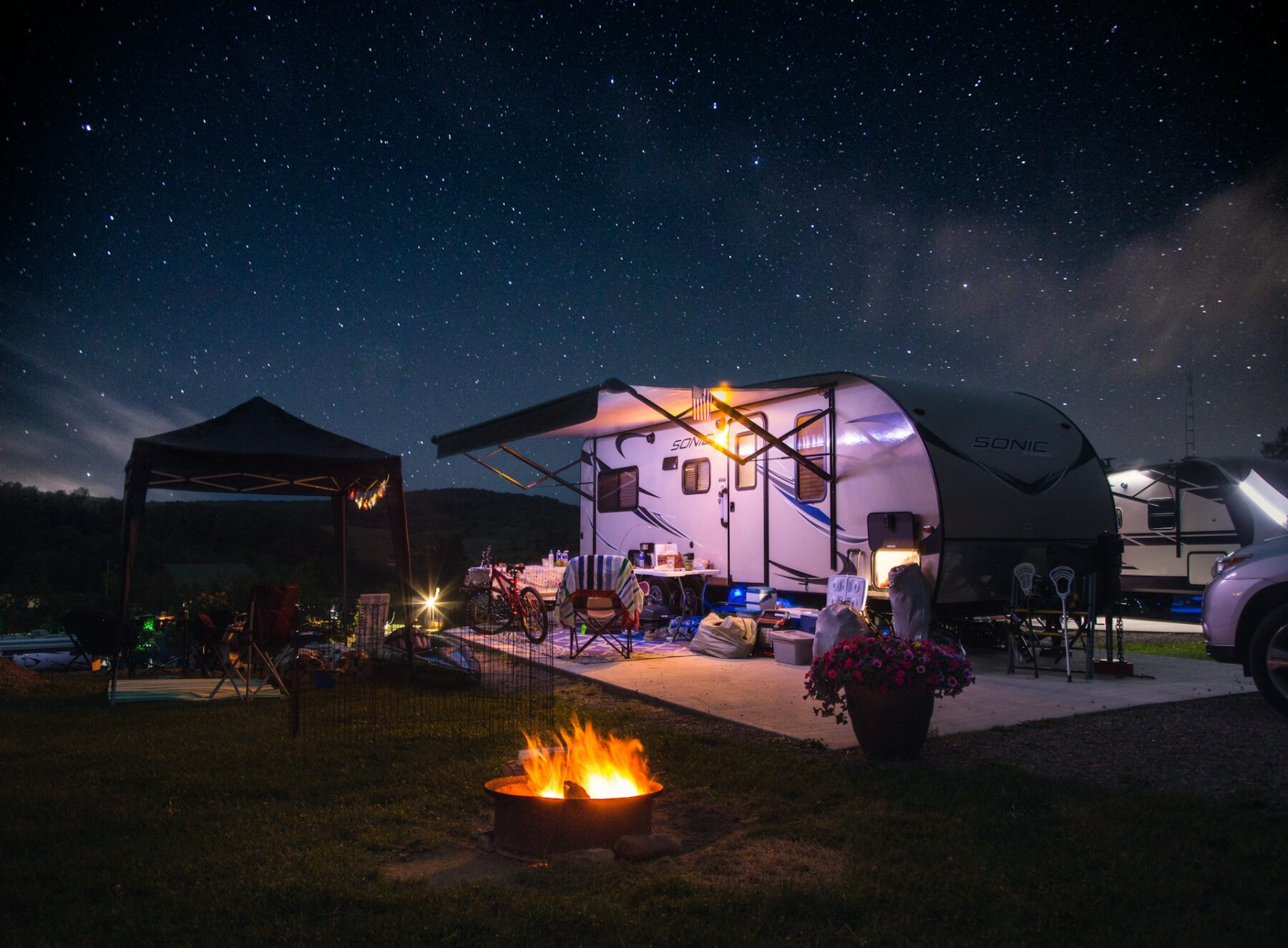
Consider who is likely to visit your RV park and choose a name that will match their expectations when visiting.
Legal and Practical Considerations For Naming Your Campground
Trademark Availability
Before finalizing a name, campground owners must conduct a trademark search to avoid infringement. Legal disputes over naming can lead to costly rebranding, including costs associated with new signage or a new logo, and loss of customer trust and name recognition.
Domain Name Availability
A matching domain name (e.g., www.examplecampground.com) is critical for online visibility.
Register your domain name with a domain registrar like Godaddy for instance, and securing social media handles with the same name ensures unified branding. Your domain name (aka website address) has to be registered and renewed yearly. These fees are included with your CampgroundWebsites.com website design package with us, and helping you choose a domain name is part of our service, so if you don’t yet have a domain name, give us a call and we’ll walk you through the process.
If the exact domain is unavailable, modifiers like “Visit” or “Retreat” can help you find an available name. You might also add your city name to help people identify your campground. Let’s say ExampleCampground.com wasn’t available. Here are some alternatives:
- Example Campground Springfield
- Visit Example Campground
- Example Campground Retreat
- Example Campground Online
Strategic Differentiation for your Campsite Name
Highlighting Unique Selling Points (USPs)
Campgrounds must identify and promote USPs in their branding. For example, “Starry Skies Campsite” emphasizes stargazing opportunities, while “The Great Outdoors Campground” might focus on curated outdoor experiences. Including amenities like “Guided Nature Walks” or “Pet-Friendly Zones” in marketing materials further distinguishes the brand, and have your name reflect that.
Sustainability and Innovation
Eco-friendly practices, such as solar-powered facilities or zero-waste initiatives, can be woven into the brand narrative. Names like “Earthbound Oasis” or “Solar Powered” attract environmentally conscious travelers and align with global trends toward sustainable tourism.
Emotional and Psychological Appeal
Storytelling Through Branding
Names like “Campfire Legends” or “Timeless Trails” invite visitors to become part of a narrative. Sharing founder stories or local legends on the website deepens emotional connections, transforming a stay into a meaningful experience.
Cultural Sensitivity
Avoiding culturally inappropriate terms or imagery is essential. For instance, using Native American tribe names without permission can alienate communities, cause a public relations issue, and spark backlash. Researching historical and cultural contexts ensures respectful branding.
Ask at least five people of different generations, career paths, or backgrounds if your name might hold any unintended context or meaning for their group, or if they see any concerns. Some names themselves may not be a concern, but when you turn the name into an acronym, it may have unintended connotations.
Future-Proofing the Brand
Scalability and Adaptability
A name like “Pioneers’ Paradise RV” allows for expansion into adjacent services (e.g., event hosting or outdoor workshops), whereas overly narrow names (e.g., “Tenter’s Paradise Campground”) limit growth if you decide to add RV sites or cabins in the future. Flexible branding accommodates evolving trends without losing your core identity.
Conclusion: Naming ideas for a campground
Branding a campground or RV park demands a strategic blend of creativity, research, and pragmatism. From aligning with audience values to securing legal protections, each decision shapes the brand’s trajectory. By prioritizing consistency, differentiation, and emotional resonance, campground owners can craft a timeless identity that stands out in a crowded market and cultivates lifelong ambassadors.
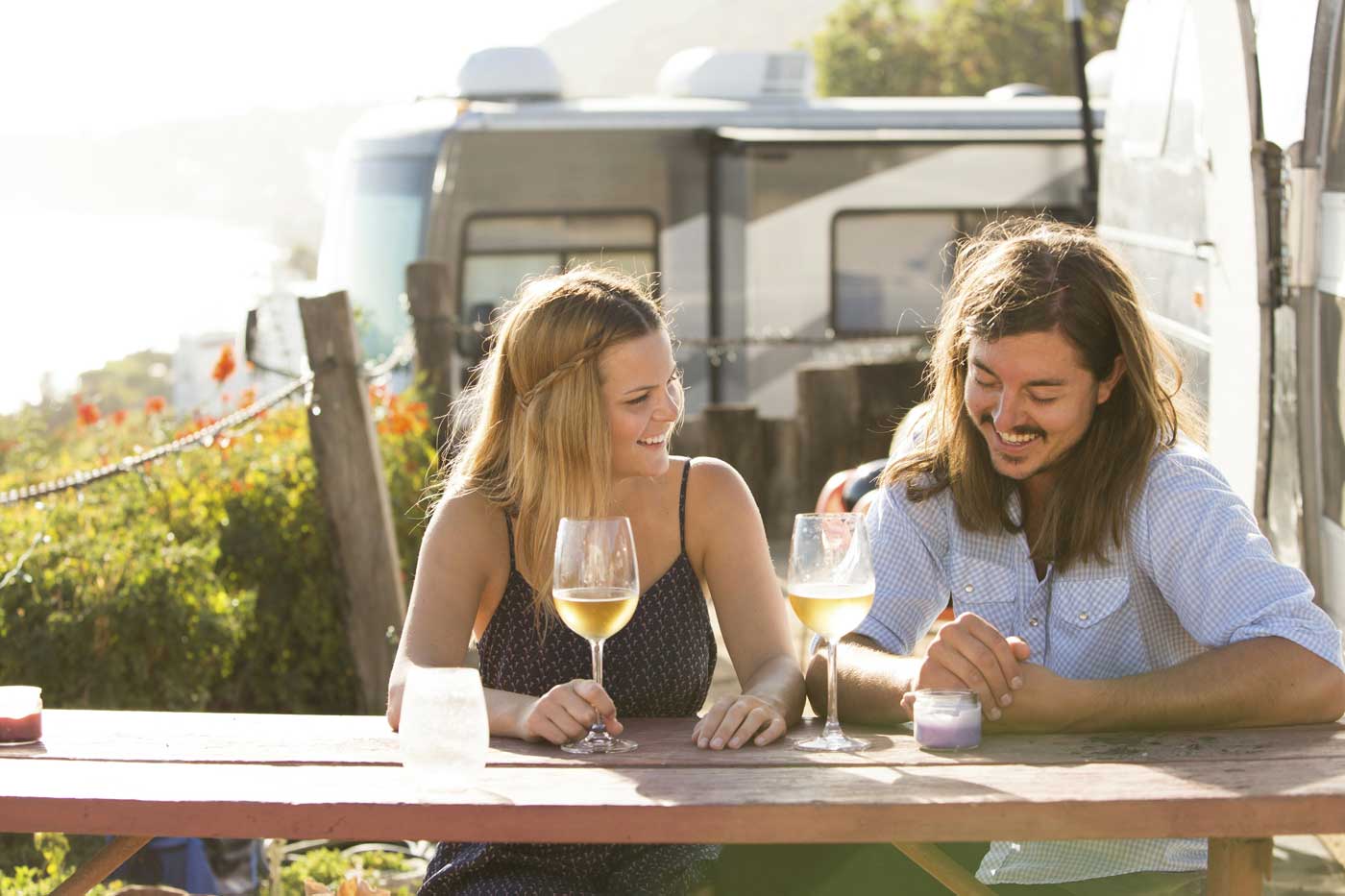
Name your campground with your guests in mind. What name will make them want to visit?
Still Stuck on Naming Your Campground or RV Park?
We’re not big on campground name generators (since they don’t take into account the important factors like SEO, memorability, and your area, SO tell us a bit about your park, and someone from our team will email you back a few great options. We’ll also check to be sure the domain name (website address) is available and send a few suggestions there also:
